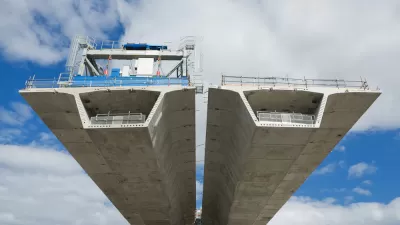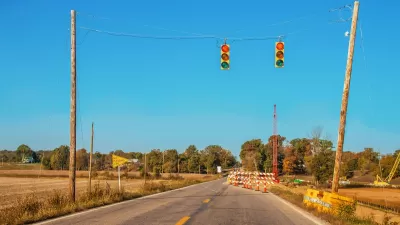Billions in federal infrastructure funding slated to go to states with few strings attached could fund roadway construction and widening projects that will raise greenhouse gas emissions and worsen climate change.

As the Biden administration prepares to distribute billions in infrastructure funding to state and local agencies, Brad Plumer writes, some experts caution that the funds could inadvertently worsen climate change by supporting road widening and construction projects.
"The new $1 trillion infrastructure law invests billions in climate-friendly programs like electric car chargers and public transit. But it also gives states $273 billion for highways over five years, with few strings attached. One analysis from the Georgetown Climate Center found that this money could significantly increase emissions if states keep adding highway lanes."
Increasingly, experts warn that if states want to slash planet-warming emissions from cars and trucks, it won’t be enough to sell more electric vehicles. They’ll also have to encourage people to drive less. In a nation built around the automobile, that’s not easy.
Kevin DeGood, director of infrastructure policy at the Center for American Progress, calls the plans for roadway expansion being proposed by many states "a major blind spot for politicians who say they care about climate change." Environmentalists point to the well-documented phenomenon of induced demand: when roads get bigger, more people choose to drive on them, and congestion quickly returns to the same levels as before.
While the Federal Highway Administration has issued 'guidance' that urges states to focus on repairs and maintenance before building new or expanded roads, as we noted earlier this week, some top Republican lawmakers encouraged governors to ignore the FHWA's recommendations.
FULL STORY: How Billions in Infrastructure Funding Could Worsen Global Warming

Alabama: Trump Terminates Settlements for Black Communities Harmed By Raw Sewage
Trump deemed the landmark civil rights agreement “illegal DEI and environmental justice policy.”

Study: Maui’s Plan to Convert Vacation Rentals to Long-Term Housing Could Cause Nearly $1 Billion Economic Loss
The plan would reduce visitor accommodation by 25% resulting in 1,900 jobs lost.

Why Should We Subsidize Public Transportation?
Many public transit agencies face financial stress due to rising costs, declining fare revenue, and declining subsidies. Transit advocates must provide a strong business case for increasing public transit funding.

Paris Bike Boom Leads to Steep Drop in Air Pollution
The French city’s air quality has improved dramatically in the past 20 years, coinciding with a growth in cycling.

Why Housing Costs More to Build in California Than in Texas
Hard costs like labor and materials combined with ‘soft’ costs such as permitting make building in the San Francisco Bay Area almost three times as costly as in Texas cities.

San Diego County Sees a Rise in Urban Coyotes
San Diego County experiences a rise in urban coyotes, as sightings become prevalent throughout its urban neighbourhoods and surrounding areas.
Urban Design for Planners 1: Software Tools
This six-course series explores essential urban design concepts using open source software and equips planners with the tools they need to participate fully in the urban design process.
Planning for Universal Design
Learn the tools for implementing Universal Design in planning regulations.
Smith Gee Studio
Alamo Area Metropolitan Planning Organization
City of Santa Clarita
Institute for Housing and Urban Development Studies (IHS)
City of Grandview
Harvard GSD Executive Education
Toledo-Lucas County Plan Commissions
Salt Lake City
NYU Wagner Graduate School of Public Service





























